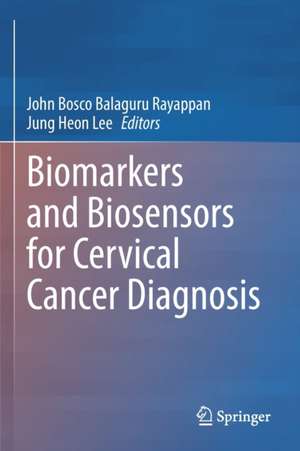Biomarkers and Biosensors for Cervical Cancer Diagnosis
Editat de John Bosco Balaguru Rayappan, Jung Heon Leeen Limba Engleză Paperback – 30 iul 2022
| Toate formatele și edițiile | Preț | Express |
|---|---|---|
| Paperback (1) | 1275.12 lei 43-57 zile | |
| Springer Nature Singapore – 30 iul 2022 | 1275.12 lei 43-57 zile | |
| Hardback (1) | 1281.45 lei 43-57 zile | |
| Springer Nature Singapore – 29 iul 2021 | 1281.45 lei 43-57 zile |
Preț: 1275.12 lei
Preț vechi: 1342.24 lei
-5% Nou
Puncte Express: 1913
Preț estimativ în valută:
244.06€ • 251.51$ • 206.04£
244.06€ • 251.51$ • 206.04£
Carte tipărită la comandă
Livrare economică 03-17 martie
Preluare comenzi: 021 569.72.76
Specificații
ISBN-13: 9789811625886
ISBN-10: 9811625883
Ilustrații: IX, 115 p. 18 illus., 15 illus. in color.
Dimensiuni: 155 x 235 mm
Greutate: 0.21 kg
Ediția:1st ed. 2021
Editura: Springer Nature Singapore
Colecția Springer
Locul publicării:Singapore, Singapore
ISBN-10: 9811625883
Ilustrații: IX, 115 p. 18 illus., 15 illus. in color.
Dimensiuni: 155 x 235 mm
Greutate: 0.21 kg
Ediția:1st ed. 2021
Editura: Springer Nature Singapore
Colecția Springer
Locul publicării:Singapore, Singapore
Cuprins
Chapter 1. An Introduction to Cancer Biomarkers.- Chapter 2. Cervical Cancer.- Chapter 3. Potential Biomarkers for Early Diagnosis of Cervical Cancer.- Chapter 4. Methods for Screening of Cervical Cancer: State of Art.- Chapter 5. Electrochemical DNA Biosensors for Cervical Cancers.- Chapter 6. Optical DNA based Sensors for Cervical Cancers.- Chapter 7. Other Biosensors for Cervical Cancer Detection.
Notă biografică
Prof. John Bosco Balaguru Rayappan is a Professor and Dean-Sponsored Research at SASTRA Deemed University, Thanjavur, Tamil Nadu, India. Presently, he is heading the Nanosensors Laboratory at SASTRA through research grants obtained from DST, New Delhi, DRDO, New Delhi, DBT, New Delhi and SASTRA Deemed University. His research interests are across diverse fields of Lattice Dynamics, Nanosensors, Biosensors, Embedded System and IoT. He has published more than 310 research articles in these fields and filed 7 patents including one US patent. He is editorial board member and reviewer for several journals and has 25 years of teaching experience.
Prof. Jung Heon Lee is an Associate Professor in the School of Advanced Materials Science and Engineering at Sungkyunkwan University (SKKU). He is also affiliated with Biomedical Institute for Convergence at SKKU (BICS), the Institute of Quantum Biophysics (IQB), and the Research Center for Advanced Materials Technology at SKKU. Prof. Lee is leading the Biological and Nanoscale Materials Laboratory at SKKU, where he is focused on developing nanoscale materials or devices which can be applied to diverse levels of biological systems for diagnostics or therapeutics. He is also investigating opportunities to adapt programmable and readily modifiable properties of biomolecules in the fabrication of smart materials or advanced nanoscale devices. He has also published more than 85 research articles in peer-reviewed international journals and filed 50 patents, including 7 US patents and 5 PCT patents.
Prof. Jung Heon Lee is an Associate Professor in the School of Advanced Materials Science and Engineering at Sungkyunkwan University (SKKU). He is also affiliated with Biomedical Institute for Convergence at SKKU (BICS), the Institute of Quantum Biophysics (IQB), and the Research Center for Advanced Materials Technology at SKKU. Prof. Lee is leading the Biological and Nanoscale Materials Laboratory at SKKU, where he is focused on developing nanoscale materials or devices which can be applied to diverse levels of biological systems for diagnostics or therapeutics. He is also investigating opportunities to adapt programmable and readily modifiable properties of biomolecules in the fabrication of smart materials or advanced nanoscale devices. He has also published more than 85 research articles in peer-reviewed international journals and filed 50 patents, including 7 US patents and 5 PCT patents.
Textul de pe ultima copertă
This book highlights both conventional and nanomaterials-based biosensors for the detection of cervical cancers. It describes developments in the selective and sensitive electrochemical biosensors based on DNA for the early diagnosis of cervical cancer. Further, this book covers other nano-biosensing systems such as nano-thermometry-based sensing platforms, mechanical sensing platforms encompassing piezoelectric-based sensors, electrochemical impedance spectroscopy based on PEGylated arginine functionalized magnetic nanoparticles, and field-effect transistor-based platforms for the early detection of cervical cancer. Also, it presents conventional platforms such as vibrational spectroscopy and polymerase chain reaction techniques for the diagnosis of cervical cancer. Finally, it reviews currently available biomarkers for the early diagnosis of cervical cancer and presents strategies for developing novel biomarkers based on cellular and molecular approaches. As such, this book is a comprehensive resource for researchers and clinicians working in cervical cancer diagnostics.
Caracteristici
Discusses various biosensors and biomarkers for cervical cancer diagnosis
Highlights molecular pathogenesis of cervical cancer
Introduces strategies for the identification of novel biomarkers for cervical cancer diagnosis
Presents conventional strategies for diagnosis of cervical cancer
Highlights molecular pathogenesis of cervical cancer
Introduces strategies for the identification of novel biomarkers for cervical cancer diagnosis
Presents conventional strategies for diagnosis of cervical cancer
